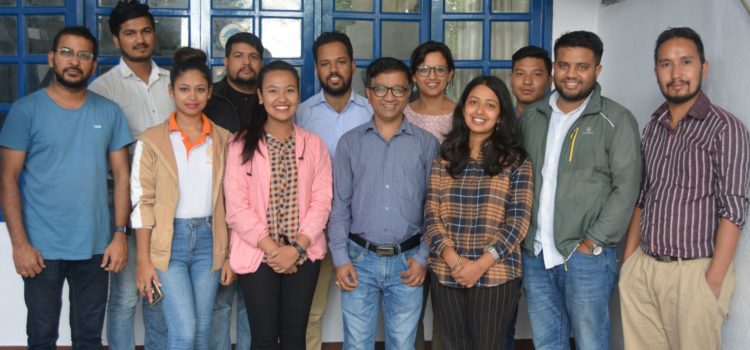I had a very exciting experience to transfer the knowledge and skills that I learned from Open Data Trainers’ Training to enthusiastic youths. Very indeed I was gratified to train total 28 youths, 12 in Kathmandu and 16 in Gaindakot. The title of the training was Monitoring social security allowance using open data while my learning. My aim of the session was to enable local CSOs to define the benefits of open data and use open data and RTI in monitoring social security allowance. The learning outcomes were enable the participants to describe different types of social security allowance being delivered by local government; differentiate data and open data in terms of features; identify benefits of open data in monitoring social security allowance and apply open data (website) and RTI request (paper) to collect data and find discrepancies if any on social security allowance.
The training was conducted in the framework of prior assessment, do, learn, review and apply. Assessment of prior knowledge of the participants was done by placing questions around social security allowance such as – do anyone in their family members receive social security allowance? If yes what type? How much government allocation on social security? How do they know this? It followed the ‘do’ part of the learning cycle engaging participants in a small exercise of matching cards on social security allowance. It enabled the environment for the participants to enter into the training subject. Participants were excitedly engaged in the exercise and quickly shared their findings in groups. Under the ‘review’ part, I confirmed whether the participants made proper matching cards describing the types of SSA and their definitions. Likewise, I took the participants to the websites of Kathmandu Metropolitan City and Gaindakot municipality and instructed them to find data related to social security allowances. I applied similar learning cycle in other sessions such as difference between data and open data, benefits of open data and application of open data and Right to Information request process to monitor social security allowance.
The learning exercise and engagement part of the participants went very well. Exercises were done on matching cards containing information on different social security allowance, group work and presentation (open data meaning and relevance, importance and features and localizing in their local governance context), case study on identifying benefits of open data while monitoring public services including social security, access, use and re-use of open data related to social security allowance of the Kathmandu Metropolitan City and writing RTI request (first application to public information officer, second appeal to the head of the office and third complaint to the National Information Commission). The alignment of open data and RTI in monitoring public service also went very well.
Data access exercise did not go well in Kathmandu due to internet disruption while this aspect of the training went well in Gaindakot. Due to time limitation the participants could not concentrate much on doing exercise on up-to-date datasets related to social security allowance. The training should at least be of two days in which data access and use aspects could be exercised in a different way. Individual exercises should also be done so that participants’ learning will be effective. Some follow-up and distance mentoring as well as small fellowship should be designed to make it more effective in future days.
The bigger impact of the training varies in Gaindakot and Kathmandu. The participants in Gaindakot were university teachers, journalists, local CSO representatives and transparency activists who have more sense on governance. So, they took the initiative to form a loose network with the slogan of ‘Transparent Gaindakot . Albeit less experienced on governance issue, the participants of Kathmandu also made commitment to use both open data and RTI to demand governance from their local government.
Our organization is delivering a TOT to the SUSASAN project staffs based in six districts. One of the themes of the training is open data so we will use this skills to capacitate the project partners. The learning cycle, session plan and content preparation part of the training will be highly benefited from the trainer’s training and subsequent conduction of two trainings.
All in all, the trainer’s training has become a boon for me to develop my career as a professional trainer on open data and other themes I am working for. It really sharpened my skills on designing training session, content and learning exercise and delivering training in a systematic way.

